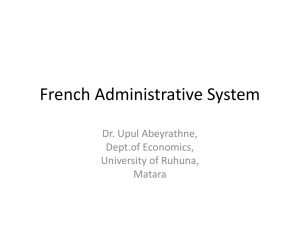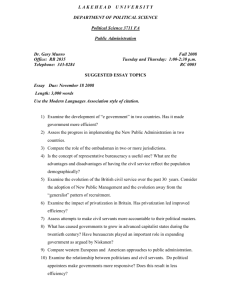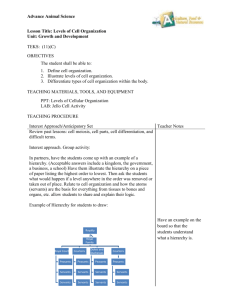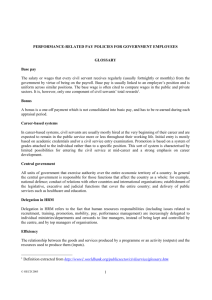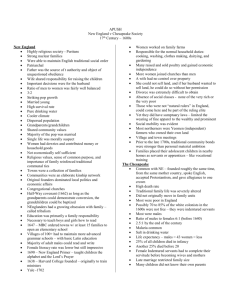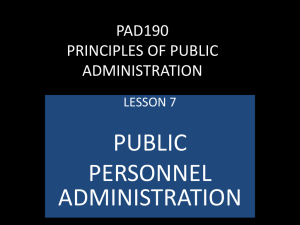4.2.2. Recruitment in Uzbekistan
advertisement
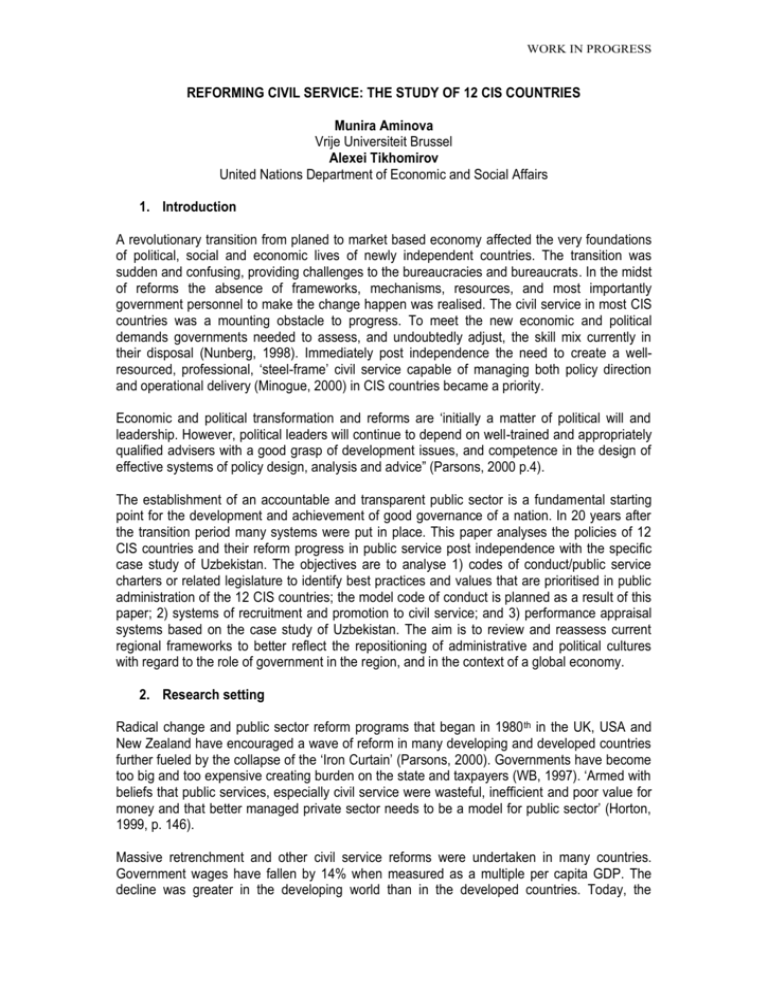
WORK IN PROGRESS REFORMING CIVIL SERVICE: THE STUDY OF 12 CIS COUNTRIES Munira Aminova Vrije Universiteit Brussel Alexei Tikhomirov United Nations Department of Economic and Social Affairs 1. Introduction A revolutionary transition from planed to market based economy affected the very foundations of political, social and economic lives of newly independent countries. The transition was sudden and confusing, providing challenges to the bureaucracies and bureaucrats. In the midst of reforms the absence of frameworks, mechanisms, resources, and most importantly government personnel to make the change happen was realised. The civil service in most CIS countries was a mounting obstacle to progress. To meet the new economic and political demands governments needed to assess, and undoubtedly adjust, the skill mix currently in their disposal (Nunberg, 1998). Immediately post independence the need to create a wellresourced, professional, ‘steel-frame’ civil service capable of managing both policy direction and operational delivery (Minogue, 2000) in CIS countries became a priority. Economic and political transformation and reforms are ‘initially a matter of political will and leadership. However, political leaders will continue to depend on well-trained and appropriately qualified advisers with a good grasp of development issues, and competence in the design of effective systems of policy design, analysis and advice” (Parsons, 2000 p.4). The establishment of an accountable and transparent public sector is a fundamental starting point for the development and achievement of good governance of a nation. In 20 years after the transition period many systems were put in place. This paper analyses the policies of 12 CIS countries and their reform progress in public service post independence with the specific case study of Uzbekistan. The objectives are to analyse 1) codes of conduct/public service charters or related legislature to identify best practices and values that are prioritised in public administration of the 12 CIS countries; the model code of conduct is planned as a result of this paper; 2) systems of recruitment and promotion to civil service; and 3) performance appraisal systems based on the case study of Uzbekistan. The aim is to review and reassess current regional frameworks to better reflect the repositioning of administrative and political cultures with regard to the role of government in the region, and in the context of a global economy. 2. Research setting Radical change and public sector reform programs that began in 1980 th in the UK, USA and New Zealand have encouraged a wave of reform in many developing and developed countries further fueled by the collapse of the ‘Iron Curtain’ (Parsons, 2000). Governments have become too big and too expensive creating burden on the state and taxpayers (WB, 1997). ‘Armed with beliefs that public services, especially civil service were wasteful, inefficient and poor value for money and that better managed private sector needs to be a model for public sector’ (Horton, 1999, p. 146). Massive retrenchment and other civil service reforms were undertaken in many countries. Government wages have fallen by 14% when measured as a multiple per capita GDP. The decline was greater in the developing world than in the developed countries. Today, the WORK IN PROGRESS worldwide civilian population averages 4% of the total population. It is largest in the developed market economies of the OECD, standing at 7.7% of the population. In Eastern Europe and the former USSR it is 6.9% and the smallest in Africa and Asia accounting 2% -2.6% of the population according to the WB. The rest of the world, Latin America, the Middle East and North Africa the number are in between, accounting 3.0 – 3.9% of the population. With regard to total employment the proportion remains the same. Worldwide civilian population accounts for about 11% of total employment, with MENA countries being highest at 17.5%, OECD 17.2% and Africa and Asia at the low end with 6.7% and 6.3%. Codes of conduct: Charters for public service are recognized as an integral part of public sector reform and institution building. They address and outline the fundamental relationship between governments and their citizens they represent commitment to public service and determine what citizens can expect as beneficiaries, providers, recipients and users of public services. Study of public service behaviour charters has revealed that they tend to reflect the context and circumstances of national politics and the ideologies and values of the key actors. Recruitment and selection: Whether it is a policymaking or service delivery – capable, motivated staff constitute the lifeblood of an effective public sector. Economic, technological, political and social pressures are now boosting the development of scientific recruitment and selection techniques, which would reduce the risk (and the cost) of failure as well as enabling the companies to focus on the future potential for development of the candidates. (Bulois, 1996). Recruitment and initial placement of the civil servant are the crucial determinants of the enduring quality of the civil service’ (Nunberg, 1995). It is, therefore, vital that it is done according to merit. The mistakes of selection would jeopardise the quality and effectiveness of public services so countries are in a search for best practices for recruitment and selection techniques (Sanjay, 1997). Introduction of competitive pressures to public service is key to the effectiveness of reforms. One of the ways of doing that is to inject merit based recruitment and promotion to the civil service as to recruit and groom politically neutral professionals whose performance is linked to their progression. This will help to enhance the capabilities of the state to function better. Performance appraisal: Performance Management can be defined as a strategic and integrated approach to delivering sustained success to organization by improving the performance of people who work in them (Armstrong and Baron, 1998). Since the early 1980s, public sector has been under constant pressure to improve its performance and organize the working process in a manner of efficiency and effectiveness (Randma-Liiv, 2004). 3. Methodology The analysis is based on the secondary data by referring to the legislature and the policies of the above countries and consultation with academic literature on the latest trends and the best practice in private and public sector. The paper is based on the previous work of the authors in the area of developing codes of conducts for CIS countries under the UNDESA in summer 2010. The paper is also based on the previous works of the authors in the area of performance appraisal under UNDP and Centre of Economic Research in Uzbekistan in the area of performance appraisal where numbers of interviews with civil servants were conducted and large amount of data collected which partially enabled this research. WORK IN PROGRESS Structured in-depth interviews were conducted with civil servants from Ministry of Finance of the Republic of Uzbekistan; State Property Committee, Stock Market ‘Toshkent’; Central Bank of Uzbekistan; and with representatives of Cabinet of Ministers in November 2007. Respondents were middle to high level officials. 4. Preliminary results Code of conduct Extensive review of legislature of CIS countries enabled us to compare the so called codes of conducts of the 12 CIS countries. The research focused on finding out prevailing values that the codes emphasize, to compare the 12 codes to find similarities and differences. It is also interesting to note the differences in codes on the regional bases. Of the 12 CIS countries only Moldova has a Code of Conduct; other countries have different type of legislative documents like Public Service Law, Civil Service Law, Administrative Code, Code of Ethics, Law on Government Service and others where they highlight the principles and values of code of conduct of a civil servant. Only one country, Uzbekistan, is still in the process of elaboration of code of conduct, but the reference could be found industry specific policies. In addition to the standard set of values like accountability, consistency, dependability, effectiveness, fairness, honesty, integrity, justice, professionalism, prudence, morality, transparency some additional values consistently appear in the legislature of CIS countries. Those are supremacy of constitution, stability of civil service, patriotism, personal responsibility etc. Overall the progress in terms of streamlining the codes of conduct is visible. Armenia Azerbaijan Belarus Georgia Kazakhstan Kyrgyzstan Moldova Russia Tajikistan Turkmenistan Ukraine Uzbekistan PSL MS PSL AC CH PSL CC PSL PSL GSL PSL LD X X X X X X X X X X X X X X X X X X X X X X X X X X X X X X X X X X X X X X X X X X X X X X X X X X X X X X X X X X X X X X X X X X X X X X X X X X X X X X X X X X X X X X X X X X X X X X X X X X X X X X X X Unity, equality of civil servants Conflict of interest Ethical Conduct Commitment and pers. responsibility Supremacy of Constitution Courtesy/Respect /Compassion Selflessness/Patri otism Responsiveness, Service to citizens Equity/Rule of aw Loyalty/Stability of civil service Efficiency/Effectiv eness Impartiality/Fairne ss Accountability Transparency/Op enness Professionalism Integrity/Honesty Type of Code Country WORK IN PROGRESS X X WORK IN PROGRESS 4.2. Systems of recruitment and promotion 4.2.1 Overview of existing systems There are generally two types of merit-based recruitment and promotion, the mandarin system that is found in France, Germany and Japan, and the open recruitment system found in the UK, New Zealand and US. Mandarin systems are characterised by competitive and rigorous entrance exams in a centralised basis. Examinations coupled with interviews, assessment centres academic degree certificate requirements etc. Usually, recruits pre-selected through single ‘feeder’ institutions in the higher educational or training systems. The idea is to lock qualified recruits into a closed system where admission is possible only at entry level. In different countries usually the entrance is A, B, C, D and E grades (levels) or starting from 1 up to 25 levels. According to the result of the tests successful candidates enter the service which largely determines the rest of their career. The most successful ones that enter at A level are placed on a fast track where their career coupled with intense trainings take them to the level of secretaries to the Ministries or state. Open recruitment systems value more technical expertise, flexibility and decentralisation, the activities are market driven and influenced by the innovations and trends existing in the private sector. The best example is US. It permits horizontal entry without age restrictions allowing great inter-agency mobility. UK is also introducing more flexibility although retaining some practices from old tradition. In this system many positions are publicly advertised and practises of the private sector used. Selection of candidates is based upon experiences and qualifications. Summary of the analysis of the two systems and their strengths and weaknesses are shown the figures below. Figure 1: Mandarin system Strengths The course is predictable, civil servants once chosen know when and where their career will take them Secure Learning from experience Esprit de corps is high Networking among the same batch, communication and negotiation is made easier Group feeling, common world view and understanding in the civil service Weaknesses Little desire for innovations, and high drive (al: attitude) to maintain the status quo Promotion not exclusively on performance Generalists and not specialists are recruited Once hired the state needs to take care of its ‘mandarins’, (al: oranges) unnecessary positions are created to provide them with jobs WORK IN PROGRESS Figure 2: Open systems Strengths Competent people with relevant skills can be recruited irrespective of age Young and fresh minds with new ideas can be brought in The civil service is not bureaucratised due to inflow of recruits from private sector, academia etc. Open minded, receptive to change and innovations Short term contract possible Weaknesses No esprit de corps Turnover may be fast and it may take time to replace personnel The recruits may not integrate and adjust to the system Personnel from the market maybe expensive to hire Procedures, rules, regulations, values and norms of the public sector can be alien to outsiders Common ethos and working relations difficult to establish 4.2.2. Recruitment in Uzbekistan Civil service recruitment in Uzbekistan is decentralised to individual ministries. The mechanisms for recruitment and appointment are virtually ad-hoc, informal, and still based on the previous soviet system. They are largely driven by informal networks and ideological determinants 'the rule of man governs rather than the rule of law' (Manion, 1985). Each public organisation has its own personnel department. ‘There is a lack of objective, measurable criteria and processes for assessment of management and other skills to demonstrate selection on merit. Roles are defined largely in relation to specialism and insufficient attention is paid to management abilities in job descriptions and qualification criteria’ (TACIS, 2000). Below is the figure which lists the criteria that is used by the Ministry of Finance to hire the personnel. As it can be seen managerial competence or skills are not explicitly mentioned in any of the criteria. Some large state bodies also recruit through internships. Recruitment is also based on the informal networks where people belong. Normally the responsible manager through his/her network can attract potential candidates to fill positions. WORK IN PROGRESS Figure 4: List of criteria for the recruitment in the Ministry of Finance higher education social background criminal history check family background experience is an advantage although not compulsory as graduate can enter straight from Universities Family history is also important Higher education is crucial and the prestige of the university does play an important role although further education and training is welcomed Citizenship is compulsory Native language proficiency is essential (however, some may well do with a Russian language as well) Knowledge of foreign languages is an advantage Selection takes place after the set of interviews, normally one with the head of HR and one with the Head of Department, sometimes also with the head of unit where applicant will be working. Many countries perceive the most urgent task to be that of filling management and policy positions with qualified professionals especially at the top level. This supports the adoption of some features of the mandarin system, which emphasises selection and grooming of elitetrained cadres for higher positions. Creating a lean, prestigious image for a small, well-chosen mandarin class can motivate lower levels staff. WB recommends using the mandarin system for the reforming countries modifying it to create flexibility by 1) allowing entry to elite class or the feeder institution at multiple points of the career path; 2) by ensuring equitable access from all parts of society; 3) by enforcing meritocratic entrance criteria. The situation is complicated with the lack of competent staff to select from. Nowadays lack of protection and low salaries in the civil service makes it very unattractive for qualified applicants. The few very few benefits include the prestige of working for the government. The situation is further complicated by the unwillingness of the government to have decentralisation functions. Therefore the preference is given to the staff which can be classified as good implementers but not those with initiative. Apart from key Ministers which have influencing power within their domains, the rest are generally deemed to be implementers of the policies and views of the higher governing bodies. So called ‘a fear of losing control’ prevails when making appointments. Widespread corruption for higher governing positions is also a result of a lack of integrated policy of the government regarding the necessary skill mix. 4.4. Performance appraisal Productivity of the civil servants, their development and appraisal, is a concern of many governments around the world. Creating systems of performance appraisal which could encompass all areas is difficult, because there is always the area which is non-measurable. Social factors, culture, values will still prevail and hinder the appropriate performance appraisal. In the civil service of Uzbekistan there are several methods which are used for appraising WORK IN PROGRESS performance of the staff. In some institutions efficiency is measured counting the quantity of the letters written, the tasks completed and the deadlines met. In most institutions there is so called Unit of Control or ‘Control Group’ which monitors the completion of the tasks, answered letters, including the responses to the government policies, laws, decrees and others. The weakness of the mechanism is obviously that control unit or group might not know the degrees and variances of complexities involved in completing different tasks. The criteria is only ‘completed’ or ‘not completed’. There is not much motivation for civil servants to spend lots of time for producing better work. The motivation is to fast complete the task and get rid of deadline pressure. In other institutions like in Central Bank the efficiency of work and performance appraisal is based on the initially set plans and targets, which are approved in the beginning of the year, in the beginning of each quarter and so on. Each employee is encouraged to establish a plan and then follow it. After certain time plans are compared with results. Another method of appraisal is so called process of attestation. This process is spread across the country and is exposed differently in different institutions. System of attestation is used with various frequencies e.g. each 2-5 years depending on the profession involved. Higher positioned civil servants go through attestation under the special commission which is formed once in several years. Normally the process of attestation is monitored by the head of the complex. For example head of overall economic complex foresees ministries and agencies of his/her own complex and the head of social complex monitors the social structures. The questions are given to the participants in advance and the participants are given time for preparation. Attestation ends with several results, the details are visible in the figure below. None of the methods explained above have the possibility to test for competence, skills, leadership capacity, motivation to work or other essential skills. Mostly the processes are rubber stamp which reduces the motivation of employees to perform better. WORK IN PROGRESS ATTESTATION Assessment of performance and professional competence Analysis of needs for development of professional and managerial skills Identify potential for promotion No immediate actions or recommendations for further skills development or training Inclusion of the person into the reserve lists Manager/ employee to action Manager or head of HR includes into reserve list but appointing authorities determine promotion Fit for the position held Identification of fitness of fit to the position hold Conditionall y fit - further review Attestation Commission, Manager and Employee to action Not fit for the position held Downsizing selection mechanism Transfer or dismiss Manager, dismissal authority to action Source: TACIS, 1999 Conclusion This paper aimed at reviewing regional best practice on the code of conducts in 12 CIS countries. The results show that this is the particular region with its own value system which is different in many ways from Europe, Latin America or other continents. Uzbekistan gained its independence about 20 years ago, is establishing its civil service, by reforming its recruitment, and streamlining its performance appraisal system although there are inherent problems in both systems (Further analysis and recommendations are to come). WORK IN PROGRESS Annex 1: Main values and principles of civil servants or of a civil service in CIS countries Armenia Armenia has a Law on Civil Service approved on 04.12.2001. The main principles of the civil service according to the above law are: a) the supremacy of the Constitution, prioritising the rights and freedoms citizens; b) the stability of the civil service; c) the unity of civil service; d) transparency of public service; e) political correctness of civil servants; e) availability of civil servants to service citizens in accordance with their professional knowledge and work skills; g) professionalism of civil servants; h) Legal and social protection of civil servants; s) the responsibility of civil servants for failure or improper performance of their official duties; a) ownership of and accountability of civil servants. Azerbaijan Law on Civil Service No 926-IQ from 21.07.2000 says that the civil service shall be based on the following principles: legality; determination of limits of legislative, executive and judicial bodies competence in the Republic of Azerbaijan; supervision over state bodies and civil servants and their accountability; obligatory execution of decisions of higher state bodies and officials within their authorities by subordinated state bodies and officials; liability of all citizens and officials to implement legal requirements of civil servants and defend their legal actions; transparency of recruitment to civil service. Source: http://dqmk.az/en/ Belarus Belarus does not have a Code of Civil Service, but the principles and general guidelines are reflected in the Law on Public Service Nr. 204-3 from 14th June 2003. The principles of Civil service as outlined in the above law are: supremacy of the constitution; serving the population, legality, prioritising human rights and freedom of speech, humanism and social justice, unity of civil service system, transparency, professionalism and competence of civil servants, accountability of public officials, personal responsibility for failure or improper performance of their official duties, accessibility, stability of public service in order to ensure continuity of power. Georgia Law of Georgia on Civil Service Nr 45, adopted in 1997 highlights the main principles of conduct of a civil servant, and in summary they are: Professionalism and ethics, the principle of collectivity, efficiency and effectiveness while performing his/her duties, he/she must avoid any action, which might damage his/her reputation, reputation of his agency or the Civil Service, he/she must be guided by the principles of transparency and the rule of law. Source: http://csb.gov.ge/content.php?id=10&lang=eng WORK IN PROGRESS Kazakhstan Law on Public Service ratified on July 23, 1999 Nr 453 and Code of Honour for civil servants approved by Presidential Decree of the Republic of Kazakhstan dated May 3, 2005 Nr 1567 are the two documents that outline principles and values of code of conduct of civil servants in Kazakhstan. The main values stressed in the two documents are: tolerance, rule of law, professionalism, ethics, patriotism, social inclusion, freedom of speech and others. Kyrgyzstan Kyrgyzstan approved the Law on Public Service on 11th of August 2004. The main principles of the law are: 1) supremacy of the Constitution of the Kyrgyz Republic, 2) dedication of public servants to the people of Kyrgyzstan; 3) the stability of public service; 4) transparency, accessibility of information about the activities of a public servant to the public; 5) professionalism, competence, initiative and honesty; 6) The equal right of citizens of the Kyrgyz Republic for the civil service; 7) discipline and personal responsibility for the execution of official duties, to ensure fair and impartial system of disciplinary responsibility; 8) accountability of public servants; and exclusion of political influence and undue interference in the activities of public servants. Moldova Moldova’s Code of Conduct of Public Official, Nr. 25 from 22.02.2008 was published on 11.04.2008 and effective from: 01.01.2009. It has 5 main principles that the public servant is supposed to adhere to, which are: a) legality; b) impartiality; c) independence; d) professionalism; e) loyalty. The Code clearly spells out each of the above mentioned values in details. Russia Russia has ratified the law on Public and Civil service of Russian Federation with new amendments on 18th July 2009, and it is effective from 22 August 2009. The main principles of civil service are: prioritization of the rights and freedoms of citizens; 2) the unity of the legal and institutional foundations of the civil service of the Russian Federation; 3) equal access of citizens who speak the official language of the Russian Federation to the civil service regardless of gender, race, nationality, origin, property and official status, place of residence, attitude to religion, convictions; 4) professionalism and competence of civil servants; 5) the stability of the civil service; 6) availability of information on civil service. Tajikistan Law on Public Service of Tajikistan is based on the following principles: 1) the supremacy of the Constitution and laws of the Republic of Tajikistan; 2) devotion to the people of Tajikistan; 3) humanism and social justice; 4) priority of the rights and freedoms of citizens; 5) democracy and transparency; 6) secularism; 7) professionalism, competence, honesty; 8) the rule of law, personal responsibility and WORK IN PROGRESS disciplined approach to responsibilities; 9) ownership and accountability; 10) the legal and social protection of the public servant; 11) good will and equal right of citizens to work in a public service. Additionally Civil servants should avoid participation in religious organizations, other public associations. Turkmenistan The law of Turkmenistan on The Service in the Government structure Nr 136-II from 2002 stipulates the principles and values of code of conduct of civil servants. The main principles incorporated into the law are following: freedom of citizens, transparency, openness, responsibility of civil servants, independence, stability of cadres, professionalism and competence, effectiveness, initiative, ability to make decisions, respect to culture and society, patriotism, respect to national traditions and culture, effectiveness, modesty, honesty and ability to critically assess the results of one’s work. Ukraine Ukraine ratified the Law on Nr. 52 Public Service on 1993. It is based on following principles: service to the people of Ukraine; democracy and the rule of law; humanism and social justice; priority of human and civil rights; professionalism, competence, initiative, honesty, dedication; personal responsibility for the execution of official responsibility and discipline; respecting the rights and legitimate interests of local and regional governments, enterprises, institutions, organizations and civil society institutions. Uzbekistan Uzbekistan does not have a unified code of conduct for civil servants, neither the law on civil service. There are sectoral laws, which define the code of conduct of the employees of that particular sector. Those uploaded here are the laws for Tax Service approved on 29 August 1997, Nr 474-I and on Customs Service ratified on 29 August 1997 Nr 472-I. The laws mainly talk about rights and responsibilities of the people working in those industries but also principles and values like professionalism, ethics, rule of law, citizen as a customer and other related principles.
